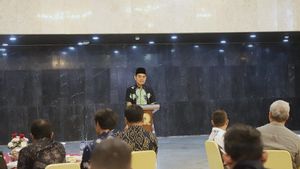JAKARTA - Meta's WhatsApp prefers to have its messaging app blocked in the UK rather than remove its security system, end-to-end encryption (E2EE) as required by the new Draft Law (RUU).
Head of WhatsApp Will Cathcart stressed that if the UK's new Online Safety Bill forces companies to stop E2EE, they will have no choice but to shut down WhatsApp in the country.
“The bill provides for a technology notice that requires communications providers to remove end-to-end encryption, to crack it,” Cathcart told The Telegraph.
“The hard reality is that we offer a global product. It will be a very difficult decision for us to make a change where 100 percent of our users lower their security."
The UK's Online Security Bill, returned to the House of Commons on December 5, gives law enforcement the power to read encrypted conversations on messaging platforms, such as WhatsApp.
This stems from a time when the government in the UK and child safety advocates are concerned about the increasing popularity of encrypted messaging systems such as Facebook Messenger and WhatsApp, which are making it more difficult to identify internet abuse.
SEE ALSO:
According to the UK government, the Online Safety Bill may as a last resort, give telecommunications regulators the power to require private messaging apps to use technology that can scan both public and private channels for child sex abuse content.
But Cathcart argues that preserving encryption is critical to protecting users' personal privacy, and removing it could lead to mass surveillance by government agencies.
"So far only authoritarian countries have banned it. We feel the best trade-off is to offer a secure service to everyone with access to it, and accept that in some countries we are banned," said Cathcart.
Citing Computing, Tuesday, December 13, as many as 2 billion people use WhatsApp globally, including 40 million users in the UK, many of them are the government.
E2EE means only the sender and receiver can see the contents of the message. Not only the UK, China, Syria, and Qatar have banned the use of WhatsApp because of this technology, while users in the United Arab Emirates (UAE) are blocked from making video calls.
For your information, earlier this year, the European Commission also launched measures aimed at tackling the increase in child sexual abuse material (CSAM) being uploaded to the internet each year.
Proposed measures to protect children from online predators and harmful content on the internet. Technology companies may be required to detect new and previously identified CSAMs and prevent them.
If it becomes law, it will apply to online hosting services and interpersonal communication services, such as messaging apps, internet service providers and app stores.
The English, Chinese, Japanese, Arabic, and French versions are automatically generated by the AI. So there may still be inaccuracies in translating, please always see Indonesian as our main language. (system supported by DigitalSiber.id)


















